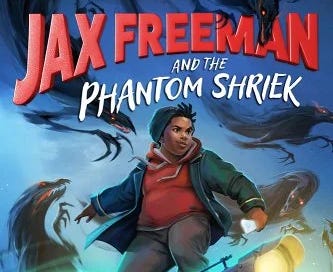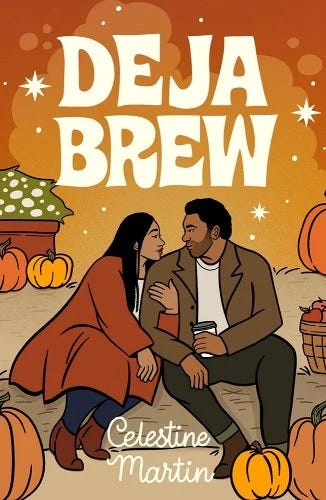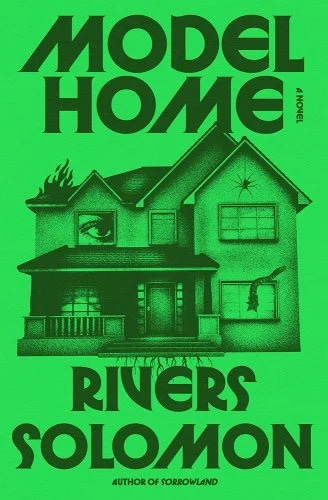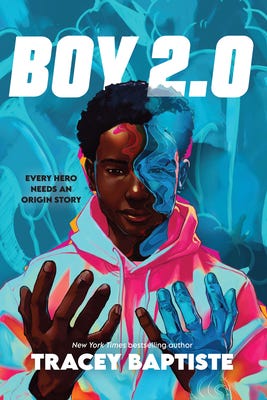Black by Popular Demand
That's right--JAX FREEMAN is here! So are some autumn romance and horror!
Happy October!
Shameless plug that JAX FREEMAN AND THE PHANTOM SHRIEKS came out today! I’ll be bopping around from Chicago, Houston, Atlanta, to DC and back to Raleigh. Catch me if you can!
Our Black-owned independent bookstore is Rooted MKE for this week. Keep Reading!
Freedom Fire: Jax Freeman and the Phantom Shriek
On his twelfth birthday, Jackson "Jax" Freeman arrives at Chicago's Union Station alone, carrying nothing but the baggage of a scandal back in Raleigh. He's been sent away from home to live with relatives he barely knows. But even worse are the strangers who accost him at the train station, including a food vendor who throws dust in his face and a conductor who tries to steal his skin.
At his new school, Jax is assigned to a special class for "summoners," even though he has no idea what those are . . . until he accidentally unleashes an angry spirit on school grounds. Soon Jax is embroiled in all kinds of trouble, from the disappearance of a new friend to full-out war between summoning families.
When Jax learns that he isn't the first Freeman to be blamed for a tragedy he didn't create, he resolves to clear his own name and that of his great-grandfather, who was a porter back in the 1920's. By following clues, Jax and his schoolmates unlock the secrets of a powerful Praise House, evade vengeful ghosts, and discover that Jax may just be the most talented summoner of all.
(Middle Grade)
Deja Brew
Ex-celebrity chef Sirena Caraway has had the wackiest October ever. Her cooking powers are on the fritz, she failed to land a career-saving job, and she embarrassed herself at the town's Halloween party. Just before midnight, she makes a desperate wish for a second chance to fix her life. The next morning Sirena wakes up and realizes that she's repeating the entire pumpkin spice-flavored month. Even sweeter, she runs into Gus Dearworth, whose magic leaves her spellbound.
A former reality star, Gus moved to Freya Grove to rebuild his reputation and heal his broken heart, but his restless magic is tempting him to return to the spotlight. And his secret crush on Sirena is making him want to try something dangerous like fall in love again. When Sirena realizes he can help her fix her powers, Gus makes her a deal. If she'll help decipher a mysterious cookbook in his collection, he'll help get her magical groove back.
Every encounter offers a new adventure--from tasting menus, harvest mazes, and a growing attraction that's taking on an irresistible enchantment of its own. But as the month winds down and the wish grows stronger, Sirena and Gus have a decision to make. Will their second chance be their happy-ever-after ending or a bittersweet memory?
(Romance)
Model Home
The three Maxwell siblings keep their distance from the lily-white gated enclave outside Dallas where they grew up. When their family moved there, they were the only Black family in the neighborhood. The neighbors acted nice enough, but right away bad things, scary things--the strange and the unexplainable--began to happen in their house. Maybe it was some cosmic trial, a demonic rite of passage into the upper-middle class. Whatever it was, the Maxwells, steered by their formidable mother, stayed put, unwilling to abandon their home, terrors and trauma be damned.
As adults, the siblings could finally get away from the horrors of home, leaving their parents all alone in the house. But when news of their parents' death arrives, Ezri is forced to return to Texas with their sisters, Eve and Emanuelle, to reckon with their family's past and present, and to find out what happened while they were away. It was not a "natural" death for their parents . . . but was it supernatural?
(Horror)
The Black Utopians: Searching for Paradise and the Promised Land in America
How do the disillusioned, the forgotten, and the persecuted not merely hold on to life but expand its possibilities and preserve its beauty? What, in other words, does utopia look like in black?
These questions animate Aaron Robertson's exploration of Black Americans' efforts to remake the conditions of their lives. Writing in the tradition of Saidiya Hartman and Ta-Nehisi Coates, Robertson makes his way from his ancestral hometown of Promise Land, Tennessee, to Detroit--the city where he was born, and where one of the country's most remarkable Black utopian experiments got its start. Founded by the brilliant preacher Albert Cleage Jr., the Shrine of the Black Madonna combined Afrocentric Christian practice with radical social projects to transform the self-conception of its members. Central to this endeavor was the Shrine's chancel mural of a Black Virgin and child, the icon of a nationwide liberation movement that would come to be known as Black Christian Nationalism. The Shrine's members opened bookstores and co-ops, created a self-defense force, and raised their children communally, eventually working to establish the country's largest Black-owned farm, where attempts to create an earthly paradise for Black people continues today.
Alongside the Shrine's story, Robertson reflects on a diverse array of Black utopian visions, from the Reconstruction era through the countercultural fervor of the 1960s and 1970s and into the present day. By doing so, Robertson showcases the enduring quest of collectives and individuals for a world beyond the constraints of systemic racism.
(Nonfiction)
Salvage: Readings from the Wreck
In Salvage: Readings from the Wreck, Dionne Brand's first major book of nonfiction since her classic A Map to the Door of No Return, the acclaimed poet and novelist offers a bracing look at the intersections of reading and life, and what remains in the wreck of empire. Blending literary criticism and autobiography-as-artifact, Brand reads Aphra Behn's Oroonoko, Daniel Defoe's Robinson Crusoe, and Jane Austen's Mansfield Park, among other still widely studied works, to explore encounters with colonial, imperialist, and racist tropes from the seventeenth to the nineteenth centuries--tropes that continue in new forms today. Brand vividly shows how contemporary practices of reading and writing are shaped by the narrative structures of these and related works, and explores how, in the face of this, one writes a narrative of Black life that attends to its own consciousness and expression.
(Nonfiction)
Hair Like Obama's, Hands Like Lebron's: A Picture Book
I have hair like Obama's and hands like LeBron's.
My mind is more magical than "Ice" McDonald's wands.
My legs, like Michael Jordan's, shatter records with a leap.
My soul is kissed by Africa--the future's mine to keep.
Inspired by the famous White House photograph of five-year-old Jacob Philadelphia touching then-president Barack Obama's hair, Weatherford's powerful text--illuminated by Savanna Durr's warm, jewel-toned art--is an ode to all the things that make Black and brown kids beautiful. Young readers will learn about many inspiring figures in Black history up to the present day, gaining confidence in their abilities and their cultural legacy as they learn.
(Children’s)
Boy 2.0
Win "Coal" Keegan has just landed in his latest foster home, with a big, noisy, slightly nosy family named the McKays. They seem eager to welcome Coal, but he's wary of trusting them. So, he doesn't tell them that he went for a walk with chalk in his pocket to cover a nearby street with his art. He doesn't tell them that a neighbor found Coal drawing, pulled a gun on him, and fired it. He doesn't tell them the police chased him. And he definitely doesn't tell them that when everything went down, Coal somehow turned invisible.
But he did.
Now he has to figure out how. Is he a superhero? Some kind of mutant? A science experiment? Is that why he has no family of his own? As Coal searches for answers and slowly learns to control his invisibility, he turns to the McKay kids and friends both new and old for help. But they soon discover they're not the only ones looking for a Black boy with superpowers, and the situation is far stranger--and more dangerous--than they ever could have expected.
(Middle Grade)
Revenge of the Tipping Point: Overstories, Superspreaders, and the Rise of Social Engineering
Why is Miami...Miami? What does the heartbreaking fate of the cheetah tell us about the way we raise our children? Why do Ivy League schools care so much about sports? What is the Magic Third, and what does it mean for racial harmony? In this provocative new work, Malcolm Gladwell returns for the first time in twenty-five years to the subject of social epidemics and tipping points, this time with the aim of explaining the dark side of contagious phenomena.
Through a series of riveting stories, Gladwell traces the rise of a new and troubling form of social engineering. He takes us to the streets of Los Angeles to meet the world's most successful bank robbers, rediscovers a forgotten television show from the 1970s that changed the world, visits the site of a historic experiment on a tiny cul-de-sac in northern California, and offers an alternate history of two of the biggest epidemics of our day: COVID and the opioid crisis. Revenge of the Tipping Point is Gladwell's most personal book yet. With his characteristic mix of storytelling and social science, he offers a guide to making sense of the contagions of modern world. It's time we took tipping points seriously.
(Nonfiction)











